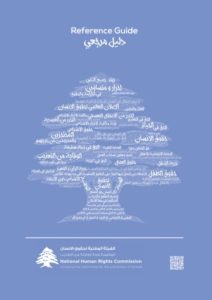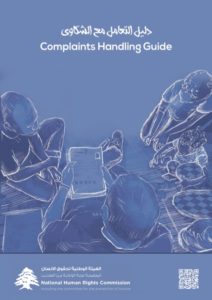he National Committee for Report Preparation and Follow-Up on Recommendations
Establishment of the National Committee for Report Preparation and Follow-Up on Recommendations
Text Type: Decree | No. 3268 | Date: 19/06/2018
Preamble
Whereas the international and regional human rights systems are witnessing continuous growth in the adoption of international human rights treaties;
And whereas these treaties, once ratified, impose multiple essential obligations on the state, which must be fulfilled and enforced, especially including cooperation and communication with the international bodies established to ensure the implementation of their provisions and regulations;
And whereas the conventions have outlined mechanisms for communication and positive interaction with the bodies emanating from them, including the preparation of initial and periodic reports and follow-up on the implementation of recommendations issued by them;
And whereas the Lebanese state has ratified the majority of these treaties and committed to adopting the measures necessary to respect their provisions and to engage with the human rights mechanisms resulting from them;
And whereas international bodies have issued numerous calls to countries, including Lebanon, to establish national mechanisms for report preparation and follow-up, particularly in light of United Nations General Assembly Resolution No. 68/268 on strengthening and enhancing the effective functioning of the human rights treaty body system, and recommendations issued by the Human Rights Council during Lebanon’s last Universal Periodic Review in October 2015;
And whereas several issues have arisen in the process of Lebanon preparing national reports required by treaty bodies and the UN Human Rights Council,
particularly regarding coordination among various concerned ministries, consultation with civil society, and difficulty in obtaining information from relevant entities, all of which undoubtedly negatively affected the quality and timeliness of the required reports, preventing Lebanon from fulfilling its obligations on time and tarnishing its reputation in international forums;
And whereas the establishment of such a mechanism is expected to resolve these issues and yield positive results through the creation of a national coordination structure involving all concerned ministries in a regular and organized manner, presenting a unified Lebanese position at international and regional levels, avoiding contradictory views, building human capacities and professional expertise in human rights, formulating a national general human rights policy, and working to strengthen it;
And whereas several sister Arab countries have preceded Lebanon in establishing such a national mechanism and are striving to develop its operational system, Lebanon—being a pioneer in the field of human rights in its region and a founding member of the United Nations—must not refrain from establishing such a mechanism;
Therefore, we propose a draft decree to establish the national mechanism as a comprehensive governmental structure encompassing various concerned ministries and administrative bodies, with a permanent mandate. It shall carry out tasks covering all human rights mechanisms (i.e., the Universal Periodic Review, treaty bodies, and special procedures), and have the capacity to establish connections and hold a central position enabling coordination, report preparation, participation, and follow-up.
The President of the Republic,
Based on the Constitution,
Based on the proposal of the Prime Minister,
And after the approval of the Council of Ministers in its sessions held on 8/2/2018 and 21/3/2018,
Issues the following:
Article 1
A National Committee is established for the preparation of reports related to international treaties on human rights issues and the follow-up on recommendations issued by international human rights protection mechanisms, chaired by the Prime Minister.
Article 2
The Secretary-General of the Committee shall be the Minister of Foreign Affairs and Emigrants or a delegate thereof.
The Committee shall be composed of the following members:
-
A representative of the Presidency of the Council of Ministers
-
A representative of the Ministry of Foreign Affairs and Emigrants
-
A representative of the Ministry of Justice
-
Three representatives from the Ministry of Social Affairs: one from the ministry, one from the Higher Council for Childhood, and one from the National Committee for Persons with Disabilities
-
Two representatives from the Ministry of Interior and Municipalities (General Directorate of Internal Security Forces and General Directorate of General Security)
-
Two representatives from the Ministry of National Defense (International Humanitarian Law Center and Military Intelligence)
-
A representative from the General Directorate of State Security
-
A representative from the Ministry of Public Health
-
A representative from the Office of the Minister of State for Displaced Affairs
-
A representative from the National Commission for Lebanese Women
-
A representative from the Ministry of Labor
-
A representative from the Ministry of Environment
-
A representative from the Central Administration of Statistics
-
A representative from the Ministry of Education and Higher Education
-
A representative from the Ministry of Culture
-
A representative from the Ministry of Information
-
[This clause was repealed by Decree No. 4437/2019]
-
A representative from the Ministry of Economy and Trade
-
Minister of State for Economic Empowerment of Women and Youth
The Committee may invite relevant official bodies to participate in its meetings as needed.
Article 3
The National Committee for Report Preparation shall undertake the following tasks:
-
Collect information from various ministries and relevant administrative bodies
-
Manage and regularly follow up on information
-
Draft and submit international reports in a timely manner
-
Follow up on recommendations from international human rights mechanisms, prepare state responses, and monitor their implementation
-
Coordinate with the judiciary regarding the application of international treaties and gather statistics for inclusion in reports
-
Coordinate with the Parliament and monitor legislative developments
-
Coordinate with the National Human Rights Institution and the Permanent National Committee for the Prevention of Torture
-
Hold consultations and coordinate with civil society organizations involved in human rights
Article 4
The National Committee for Report Preparation and Follow-Up on Recommendations is granted the authority to represent the state in communication with international and regional human rights bodies, prepare reports and replies to communications and special rapporteurs’ reports during their visits to Lebanon, coordinate with them, provide requested clarifications, and facilitate and follow up on visits from treaty-based committees and bodies. It will also liaise with other governmental and non-governmental entities to ensure the success and benefit of these visits.
Article 5
A Secretariat shall be established within the National Committee to perform the executive tasks requested by the Committee, including managing information, creating a database from ministry inputs, organizing meetings and schedules, and coordinating between ministerial representatives.
Article 6
Committee members are granted freedom to communicate and schedule meetings as needed to ensure the efficiency and speed of the work for which the Committee was established.
Article 7
Secretariat staff compensation shall be determined by decree upon the proposal of the Minister of State for Human Rights. Committee members shall receive compensation in the form of meeting allowances, as they serve as human rights focal points in their respective ministries.
Article 8
All ministries shall cooperate with the Committee and provide assistance without delay.
Article 9
This decree shall be published and communicated where necessary.
هذه المقالة متاحة أيضًا بـ: العربية (Arabic) Français (French)


